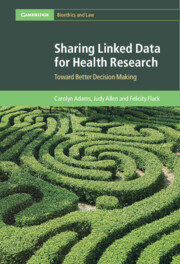Book contents
- Sharing Linked Data for Health Research
- Cambridge Bioethics and Law
- Sharing Linked Data for Health Research
- Copyright page
- Epigraph
- Contents
- Figures
- Tables
- Foreword
- Acknowledgements
- Abbreviations
- Introduction
- Part I Context for Decision Making
- 1 Research Using Linked Data
- 2 Individual, Collective, and Public Interests
- 3 Social Licence
- Part II Frameworks for Decision Making
- Part III Practice and Process of Decision Making
- Glossary
- Index
- Cambridge Bioethics and Law
- References
1 - Research Using Linked Data
from Part I - Context for Decision Making
Published online by Cambridge University Press: 02 June 2022
- Sharing Linked Data for Health Research
- Cambridge Bioethics and Law
- Sharing Linked Data for Health Research
- Copyright page
- Epigraph
- Contents
- Figures
- Tables
- Foreword
- Acknowledgements
- Abbreviations
- Introduction
- Part I Context for Decision Making
- 1 Research Using Linked Data
- 2 Individual, Collective, and Public Interests
- 3 Social Licence
- Part II Frameworks for Decision Making
- Part III Practice and Process of Decision Making
- Glossary
- Index
- Cambridge Bioethics and Law
- References
Summary
Chapter one sets the context of linked data for research. It describes the ways in which linked data is being used to improve diagnosis, treatment and healthcare delivery and to understand the drivers of health. The advantages of using linked data for research are discussed. The chapter surveys the kinds of data currently being linked for research and different linkage methods and considers the potential and challenges for future international data linkage.
Keywords
Information
- Type
- Chapter
- Information
- Sharing Linked Data for Health ResearchToward Better Decision Making, pp. 11 - 27Publisher: Cambridge University PressPrint publication year: 2022
References
Accessibility standard: Unknown
Why this information is here
This section outlines the accessibility features of this content - including support for screen readers, full keyboard navigation and high-contrast display options. This may not be relevant for you.Accessibility Information
- 1
- Cited by
